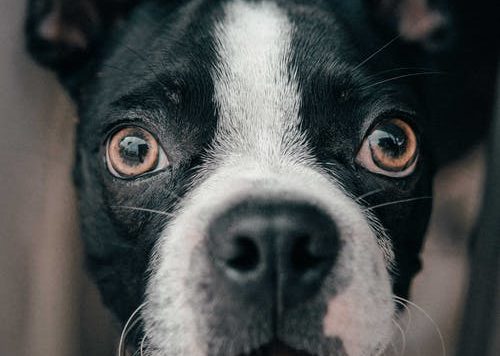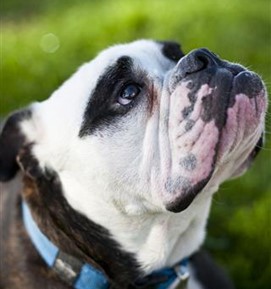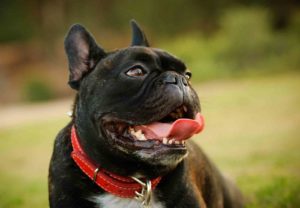A dog’s nose is generally wet because it licks it often to keep it moist, which helps the dog to process their environment as they collect information through sniffing and transferring scents to scent detecting “olfactory” glands. This allows the dog to understand their environment and locate where smells are coming from. Additionally, the lining of your dog’s nose contains mucus producing glands that keep nasal passages moist, as well as producing a clear watery fluid that helps to keep your dog cool.
If your dog’s nose is dry, it does not mean that your dog is unwell. If it is extreme than you should of course visit your vet to rule out any health issues, but if its dry from time to time, there are actions you can take to make your canine buddy more comfortable.
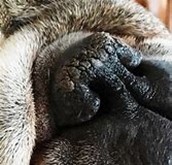
Let’s looks at some common reasons for a dog to have a dry nose
We’ve already established that a wet nose is normal, but a dry nose is not necessarily abnormal. Some dogs just have naturally dryer noses than others. Let’s now look at some reasons why your dog’s nose may appear dry and cracked.
1. Sleeping dogs don’t lick!
When your dog is asleep he does not lick his nose, which means when he wakes up he may have a dry nose. You’ll quite often see your pup lick his nose when he first wakes up to return moisture to his nose.

2. Dehydration
Continuous exercise over a sustained period can be dehydrating for your dog, and can lead to a dry nose. This is particularly present when your pup does not have access to water or does not drink water when it is available (keep an eye on the latter if your dog refuses water over a long period of time). Try to ensure you carry water with you to keep your dog hydrated on long walks or when out in the heat of day.
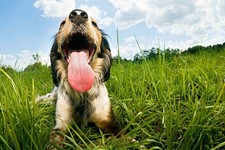
3. Exposure
When out in the sun, wind or cold, your dog’s nose is susceptible to chapping or even sunburn – Ouchy! Even the heat emulating from a warm fire can have this affect. There are many doggy sunscreens out there to help protect your pal from environmental elements.
4. Age
Just like humans that develop dryer skin as they age, a dog many also develop a dry nose as it ages.

5. Allergy to plastic
Plastic bowls are a common way to give your dog food or water, however some dogs can have a skin aversion to plastic. It is best to use ceramic bowls, and you can still pop them in the dish washer for an easy clean.
6. A skin disorder
If your dog’s nose is severely cracked, has scabs or sores, or if the dryness is accompanied with other symptoms like vomiting or diarrhoea, or discomfort, it’s time to take him to the vet to see if there is an underlying health problem.
What can we do to help alleviate a dry nose?
Sometimes our little buddies could use some assistance with restoring their nose to good sniffing order. Not all balms need to be complex or store bought, here is a sample of different types of balms and moisturisers available for you and your pooch.

1. Balm
You can sooth your dog’s nose by applying a balm either temporarily as required or as a regular daily regime. A fit for purpose moisturising balm should be edible and safe, such as all-natural Snout Soother, a favourite among many dog owners and breeders.

2. DIY Nose Balm
You can make your own balm such as this one from DYI WellnessMama. It includes coconut oil (infused with dried comfrey leaf, dried plantain leaf, dried calendula and yarrow flowers), Shea Butter and Beeswax.
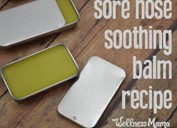
3. Coconut Oil
Balms don’t have to be complex, Coconut oil is one of the safest, most effective moisturizers found in nature. It can be just as helpful for dogs as it is for humans, by restoring moisture and improving elasticity. It provides powerful moisture restoration qualities for your dog’s dry nose, skin, and hair.
4. Shea Butter
People use Shea butter to soften and moisturise our skin. It works exactly the same way on dry dog noses. You can also use it to moisturise dry paws and elbows. Handy!
5. Olive Oil
We all have a bottle of olive oil in our kitchen, but did you know that it can be used on dry noses? It can also be applied to dry paws and ears. And it perfectly healthy for your dog it consume it when they lick their noses.
Whatever you choose, make sure that every lotion is safe for ingestion, as your dog will lick his nose. Most general skin lotions for humans, such as Neosporin, are not safe for dog consumption. Human lubricants have the potential to impact healthy gut bacteria and can result in vomiting or diarrhoea. For this reason avoid over the counter lotions, unless your vet has specifically recommended it to you.
Now that you’ve sorted this dryness and discomfort for your pal, it’s time to hit the park for some tail wagging walks and ball chasing fun! Play time is great for both humans and their fur buddies. Enjoy!
PS We’d love to hear from you about the best products you’ve found to help with nose dryness so we can share with our DogBoxNZ community. Please feel free to leave your comments below and if there is a link to the product that you have tried and love, include that as well!! Thanks!

